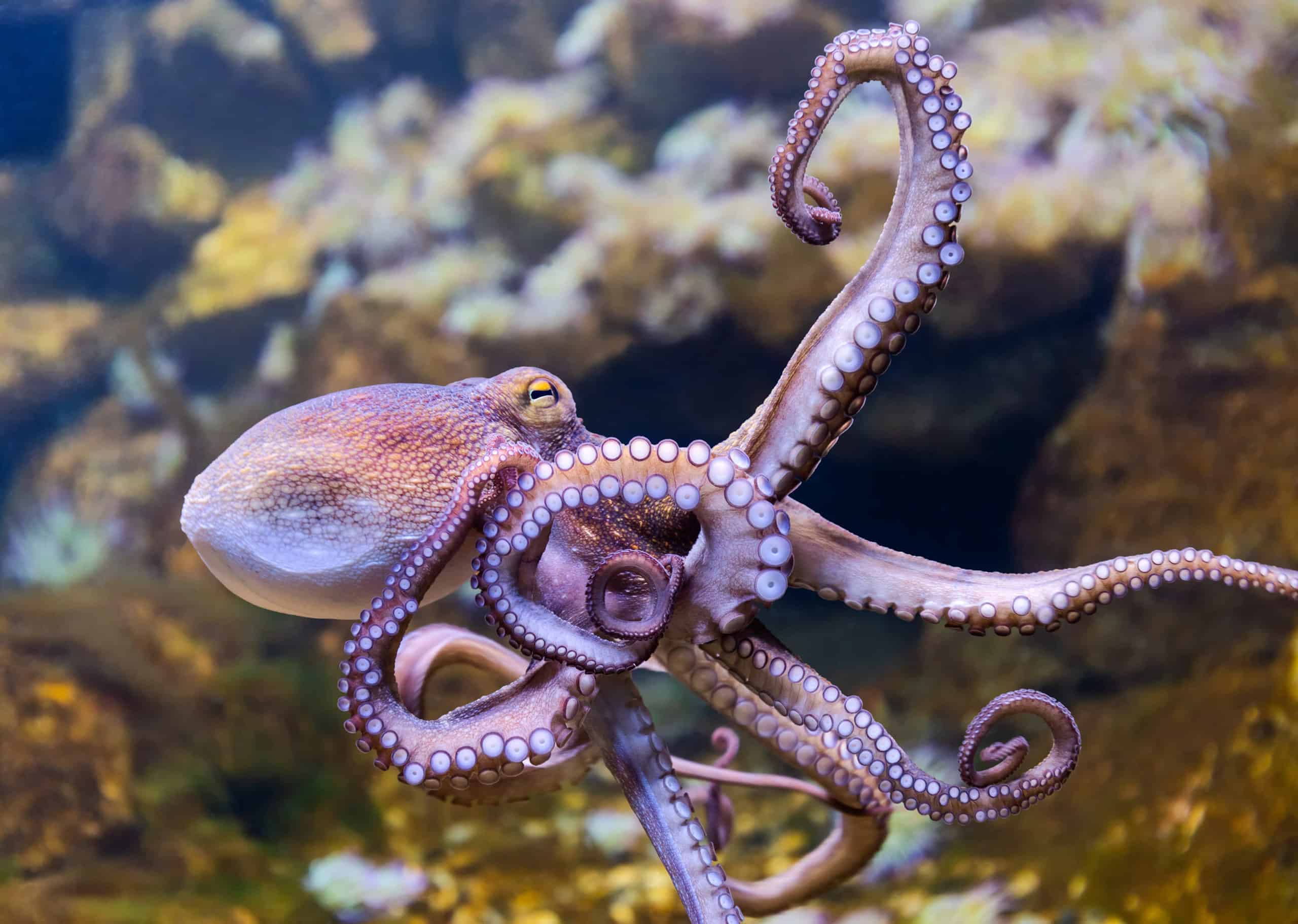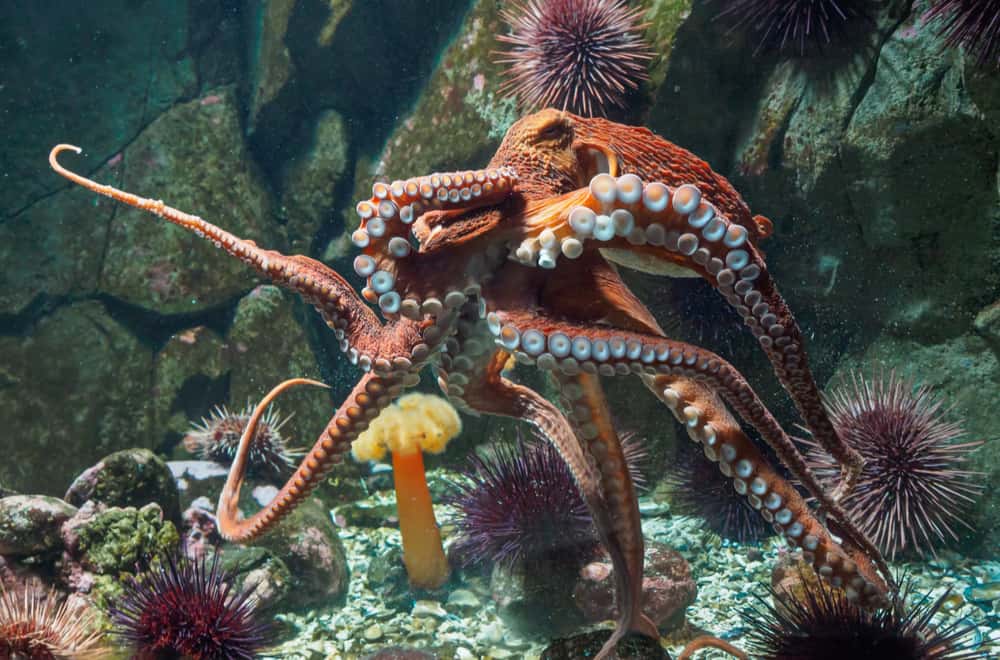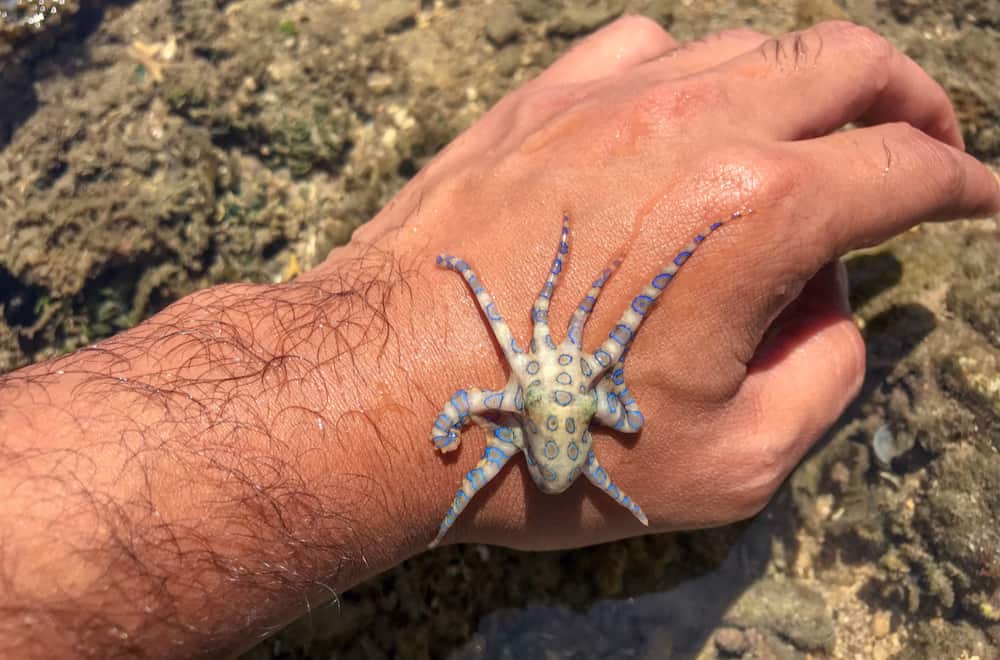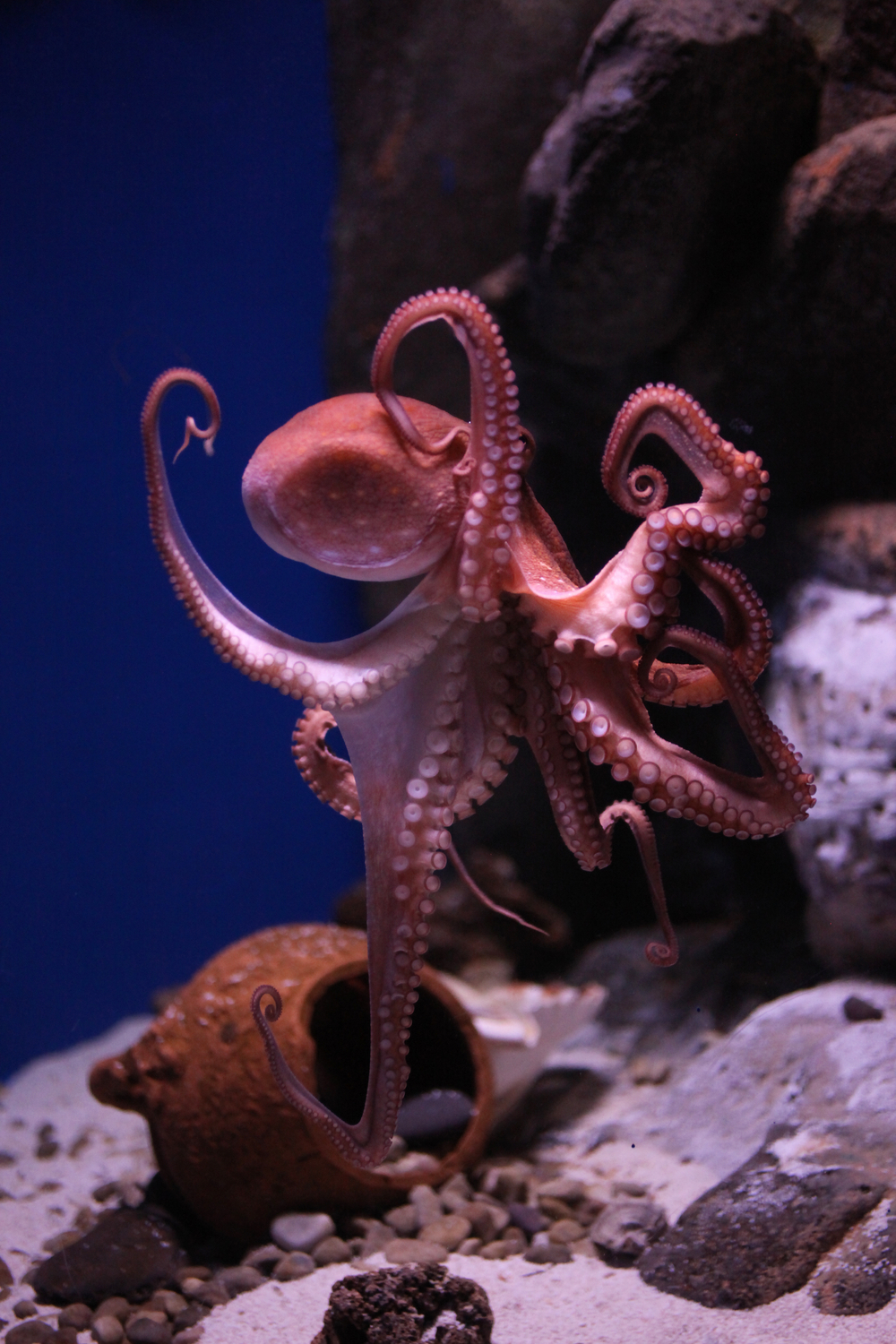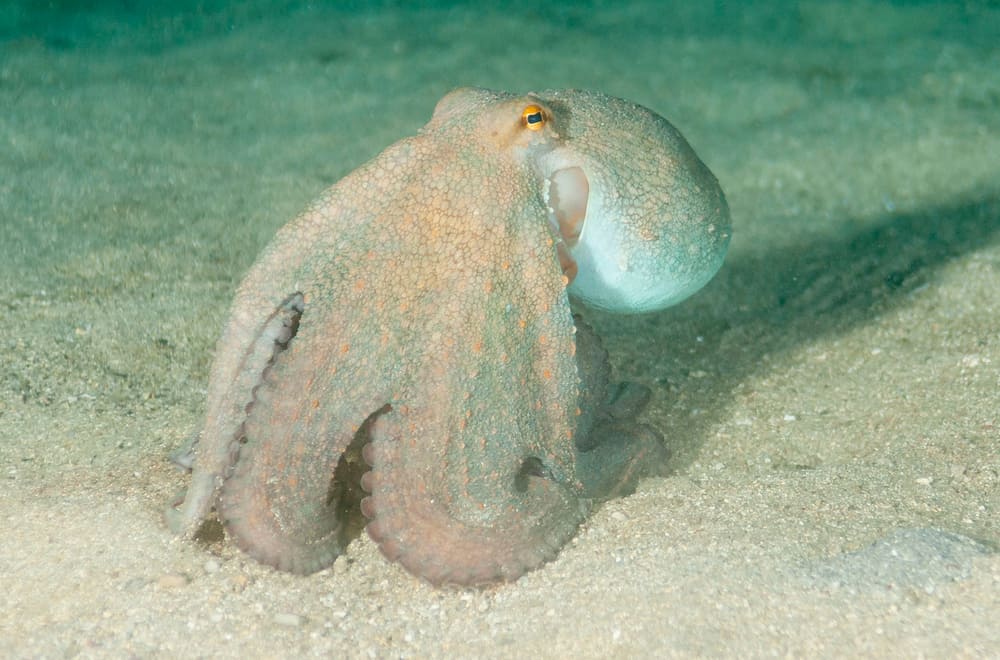With their alien-like heads and their eight arms constantly flicking about to feel their way around, octopuses are certainly strange creatures to look at.
However, they’re also complex, highly intelligent animals, making them one of the most fascinating of the ocean’s inhabitants – so to shed some light on their lives and behavior, in this post we answer the question, what do octopuses eat?
What do octopuses eat in the wild?
Octopuses are technically a kind of mollusk belonging to the Cephalopoda class – along with squid and cuttlefish – and there are over 300 species of octopus around the world.
They are found in all the world’s oceans at varying depths, and they come in many shapes and sizes, from tiny ones that fit in your hand to giant monsters with 9-metre (30ft) arm spans.
This means that octopuses dine on a wide range of morsels, but they all have something in common – almost all of them eat only meat. Octopuses are known to feed on all kinds of other sea creatures, but one thing they generally don’t eat is veg.
An octopus’ diet changes as it grows in size – although some of the smallest species, like the blue-ringed octopuses, never grow big enough to move onto the larger prey species that other octopuses can eat.
So working from small to large, let’s look at a list of some of these cephalopods’ favorite foods.
Small octopuses
When octopuses first emerge from their eggs, they are tiny, which limits the types of food they can eat. Here’s what’s on the menu for baby octopuses as well as for species that don’t grow big enough to eat anything else:
- Plankton
Plankton are a diverse collection of extremely small organisms that float in the sea, and when they are born, baby octopuses can’t eat anything else.
They start off eating nanoplankton before moving on to larger microplankton as they grow. When they get bigger, they can eat the bigger mesoplankton too.
- Small mollusks
Small octopuses also enjoy eating small mollusks, including gastropods like sea snails.
Medium octopuses
When octopuses grow larger, their diet expands as the number of different prey animals they can tackle increases, and species like the common octopus (Octopus vulgaris) enjoy a varied diet. Here’s a list of some of medium-sized octopuses’ favorites:
- Shrimp
Most octopuses will eat shrimp whenever they can get it, and this is one of their favorite foods.
- Crab
Crab is another food that most octopuses love eating, and they’re well developed for catching crabs in their tentacles and devouring them.
- Gastropods
Bigger octopuses will tackle larger gastropods like sea snails, which are easy to catch and delicious to eat – if you’re an octopus, in any case.
- Clams and other shellfish
Once octopuses reach a certain size, shellfish like clams are also on the menu.
Interestingly, octopuses have a special adaptation for dealing with shellfish. They use tiny teeth on the end of what’s known as the salivary papilla to drill into the shell, and once this is done, they inject a venom into the victim.
This causes the muscles of the shellfish to weaken and relax, allowing the octopus to prize it open with ease and devour the unfortunate occupant.
Check out this video to see them at work – and there are some pretty cool shots of octopuses running across the seabed too!
Big octopuses
When octopuses reach their maximum size, their diet diversifies even more, so let’s have a look at some of the stuff the largest octopuses, like the huge 250kg (550lb) giant Pacific octopus (Enteroctopus dofleini), are capable of eating.
- Shrimp
Like medium-sized octopuses, larger ones also enjoy tucking into shrimp whenever they can.
- Crab
Crab is also a favorite snack option for larger octopuses – and the bigger they grow, the bigger the crabs they’re willing to tackle.
- Fish
Larger octopuses are also quite happy to catch and devour fish whenever the chance arises. This represents something of a turning of the tables since many fish are happy to take a bite out of an octopus when the octopus is not so big.
Some octopuses have even been known to take smaller sharks like the dogfish shark.
- Squid
Squid are a close relative of octopuses, but an octopus won’t think twice about gobbling one down if it gets the chance. However, squid can fight back aggressively, so an octopus needs to grow to a certain size before thinking about taking one on.
- Other octopuses
Big octopuses will also eat other octopuses if they can – although they will usually go for individuals that are smaller than they are or they risk being eaten themselves if they lose the fight.
- Shelled sea mollusks
As well as cephalopod mollusks like squid and other octopuses, large octopuses will also continue to eat shelled mollusks like sea snails.
Fun facts about octopuses
1. Cephalopod means “head foot” in Greek
Octopuses belong to the class of mollusks known as Cephalopoda, which comes from the Greek words for “head” and “foot”.
They were given this name because their heads are connected directly to their tentacles, which are a more developed form of the common molluscan foot.
2. Octopuses are extremely intelligent and exceptional escape artists
Despite their somewhat bizarre appearance, octopuses are highly intelligent animals that are capable of learning how to use tools. They can also solve puzzles, for example, opening a jar to get at the food contained inside.
Furthermore, they are also thought to be able to remember locations, which helps them with navigation and finding food.
Since they are extremely flexible – they are made up of 90% muscle and have no skeleton – this makes them excellent escape artists, and it is very common for them to find ways out of their tanks when held in captivity.
They can often work out how to open lids or turn handles, and since they can squeeze their bodies through tiny holes, they never cease to surprise their keepers with their amazing ability to pull a Houdini.
Check out this video to see one in action.
3. Octopuses have three hearts
Octopuses have no fewer than three hearts, and two of these, known as branchial hearts, are used solely to pump blood through the gills. A third heart is then used to pump oxygenated blood all around the rest of the octopus’ body.
4. All octopuses have venom
All species of octopus are venomous to varying degrees, although not all are dangerous to humans.
The blue-ringed octopus, however, is considered one of the most venomous animals in the sea. This octopus is very small and has a docile disposition, so it won’t usually attack humans – but if it stings you, it can easily lead to death.
As a general rule, you shouldn’t handle anything unfamiliar from the sea because lots of animals have nasty bites and stings.
This is advice the girl in this video obviously hadn’t heard – because when the video was shot, she had no idea she was holding one of the most deadly octopus species there is!
5. Male octopuses die after mating
Male octopuses only live long enough to mate once with a female, after which they die. The female continues to live until her eggs hatch, and then she dies too. Depending on the species, this means octopuses only live between one and three years.
6. Octopuses taste food by touching it
Octopuses have an interesting way of tasting their food. They do it by touching food with their tentacles before putting it in their mouth, and each sucker is equipped with up to 10,000 chemoreceptors that give the octopus information about the potential food.
Once the octopus has “tasted” the food, it will then put it in its mouth and eat it. Since octopuses don’t have taste receptors in their mouths, anything that gets that far has already been deemed good to eat.
This might seem quite alien to us, but it’s arguably a better system than we have. Taste receptors are there to tell us whether food is ok to eat or if it will poison us – and to judge this, we put food in our mouths.
However, octopuses taste food before it goes anywhere near their mouths, which can help them avoid eating anything bad without there being any risks of being poisoned by it from taking an exploratory bite.
7. The plural of “octopus” is “octopuses”, not “octopi”
You may sometimes come across “octopi” used as the plural of “octopus”, but this is incorrect.
This usage comes from the mistaken assumption that the word octopus is derived from a Latin 2nd declension noun or adjective ending in -us – whereas in fact, it comes from a Greek or Latin 3rd declension noun.
Alternatively, people may simply see the pattern of cactus-cacti (which is correct) and assume the same is true for octopus, which it isn’t.
In any case, the correct plural for “octopus” is “octopuses” – which is what we’ve used throughout this post!
A varied but meat-based diet
As we have seen, octopuses eat a wide range of foods, but almost exclusively, their diet is based on meat. With their dexterity and intelligence, they’re also fascinating creatures to observe – as long as you can get past their undeniably weird appearance!
